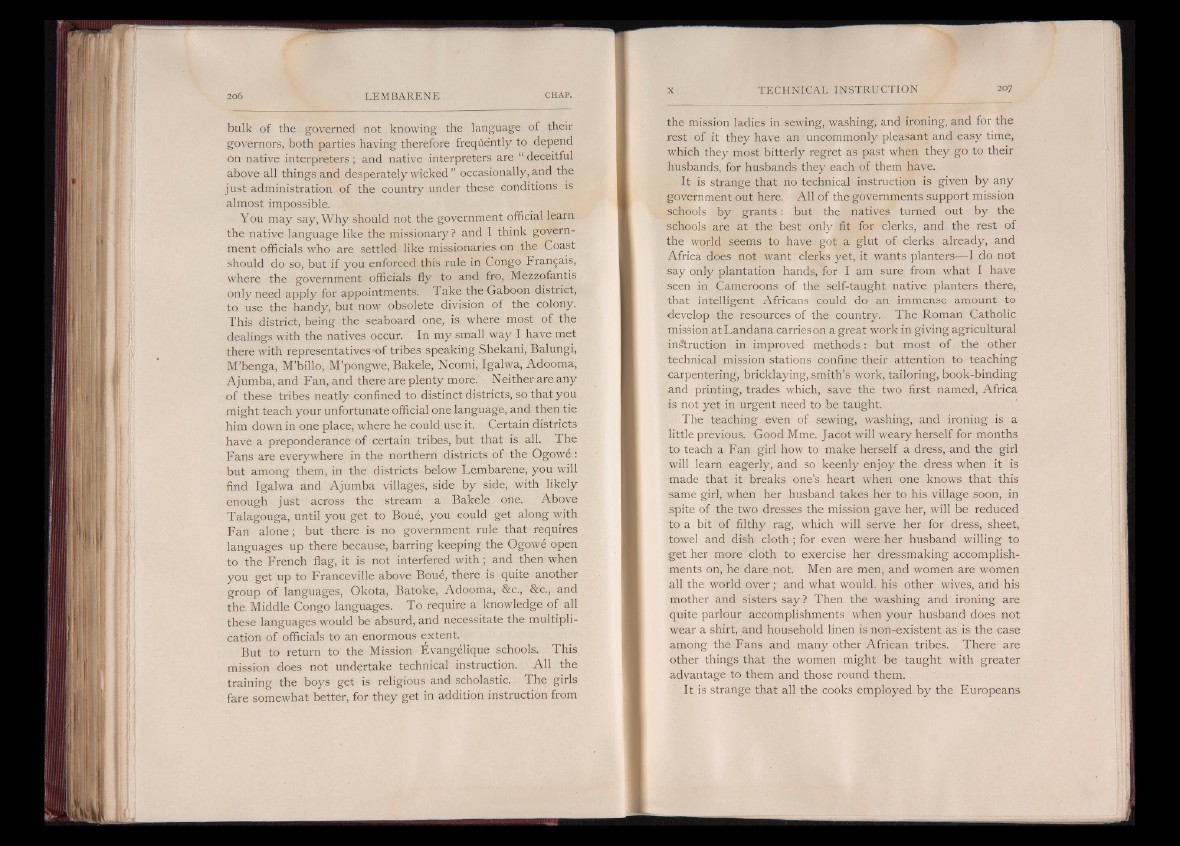
bulk of the governed not knowing the language of their
governors, both parties having therefore freqûe'ntly to depend
on native interpreters ; and native interpreters are “ deceitful
above all things and desperately wicked ” occasionally, and the
just administration of the country under these conditions is
almost impossible.
Y ou may say, Why should not the government official learn
the native language like the missionary ? and I think government
officials who are settled like missionaries on the Coast
should do so, but if you enforced this rule in Congo Français,
where the government officials fly to and fro, Mezzofantis
only need apply for appointments. Take the Gaboon district,
to use the handy, but now obsolete - division of the colony.
This district, being the seaboard one, is where most of the
dealings with the natives occur. In my small way I have met
therewith representatives »of tribes speaking Shekani, Balungi,
M’benga, M'billo, M’pongwe, Bakele, Ncomi, Igalwa, Adooma,
Ajumba, and Fan, and there are plenty more. Neither are any
o f these tribes neatly confined to distinct districts, so that you
might teach your unfortunate official one language, and then tie
him down in one place, where he could use it. Certain districts
have a preponderance of certain tribes, but that is all. The
Fans are everywhere in the northern districts of the Ogowé :
but among them, in the districts below Lembarene, you will
find Igalwa and Ajumba villages, side by side, with likely
enough just across the stream a Bakele one. Above
Talagouga, until you get to Boué, you could get along with
Fan alone; but there is no government rule that requires
languages up there because, barring keeping the Ogowé open
to the French flag, it is not interfered with ; and then when
you get up to Franceville above Boué, there is quite another
group of languages, Okota, Batoke, Adooma, &c., &c., and
the Middle Congo languages. To require a knowledge of all
these languages would be absurd, and necessitate the multiplication
of officials to an enormous extent.
But to return to the Mission Évangélique schools. This
mission does not undertake technical instruction. All the
training the boys get is religious and scholastic. The girls
fare somewhat better, for they get in addition instruction from
the mission ladies in sewing, washing, and ironing, and for the
rest of it they have an uncommonly pleasant and easy time,
which they most bitterly regret as past when they go to their
husbands, for husbands they each of them have.
It is strange that no technical instruction is given by any
government out here. All of the governments support mission
schools by grants: but the natives turned out by the
schools are at the best only fit for clerks, and the rest of
the world seems to have got a glut of clerks already, and
Africa does not want clerks yet, it wants planters— I do not
say only plantation hands, for I am sure from what I have
seen in Cameroons of the self-taught native planters there,
that intelligent Africans could do an immense amount to
develop the resources of the country. The Roman Catholic
mission atLandana carries on a great work in giving agricultural
instruction in improved methods: but most of the other
technical mission stations confine their attention to teaching
carpentering, bricklaying, smith’s work, tailoring, book-binding
and printing, trades which, save the two first named, Africa
is not yet in urgent need to be taught.
The teaching even of sewing, washing, and ironing is a
little previous. Good Mme. Jacot will weary herself for months
to teach a Fan girl how to make herself a dress, and the girl
will learn eagerly, and so keenly enjoy the dress when it is
made that it breaks one’s heart when one knows that this
same girl, when her husband takes her to his village soon, in
spite of the two dresses the mission gave her, will be reduced
to a bit of filthy rag, which will serve her for dress, sheet,
towel and dish cloth; for even were her husband willing to
get her more cloth to exercise her dressmaking accomplishments
on, he dare not. Men are men, and women are women
all the world over; and what would, his other wives, and his
mother and sisters say? Then the washing and ironing are
quite parlour accomplishments when your husband does not
wear a shirt, and household linen is non-existent as is the case
among the Fans and many other African tribes. There are
other things that the women might be taught with greater
advantage to them and those round them.
It is strange that all the cooks employed by the Europeans